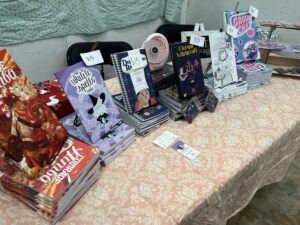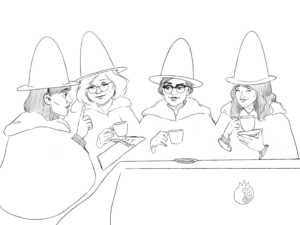As I write this article, I’m sitting on my porch, looking over the parking lot of my apartment building. Normally at this time of day I would tug on my shoes, plug in my ear buds and go for a run through a nearby greenbelt that connects to a residential neighborhood with broad sidewalks. I would finish running along the road by my house and cut back into my apartment complex in the gathering dusk.
Except I cannot do that today or tomorrow or possibly for quite some time, not if I value my physical safety. Yesterday, I found a notice on my door from my building manager. The notice warning me that there had been an attempted assault at a nearby intersection, one that my running route goes through. It is where I usually stop to take a drink of water after climbing the hill, my ears deafened by music, my thoughts a thousand miles away.
The attack was the latest in a series of assaults and rapes over the last few weeks in my area. There have been no leads in the case beyond a highly vague description of the suspect as short, Hispanic and wearing a hoodie. A description of someone as short and Hispanic in North Austin is about as useful as a description of a suspect as being average-looking and white. The night after I read the notice I hesitated to leave my car when I saw a figure in my parking lot. Then the man waved and I recognized him as a neighbor. The description of the suspect was so generic I saw him everywhere and nowhere.
The next day, I drove down to Town Lake and ran around the trail there. As I dogged around the slower runners on the crowded trail, something completely different than fear bubbled up inside of me: anger, cold and sharp. I had lost something, and so had everyone else in my neighborhood.
One of the main reasons my girlfriend and I had chosen our neighborhood was because it was supposed to be safe for me to go running. The ability to tug on my shoes and be beneath the canopy of the greenbelt within minutes had tempted me to move farther north than was convenient.
Now I had lost the feeling of being safe, of being able to walk out my front door without looking over my shoulder. I had lost the peaceful solitude of running beside the creek alone. A man who I have never and hope to never meet took something from me and made me feel afraid. He took a piece of my freedom. He took it from everyone in my part of the city and that is no small loss.
This article is not a call to direct action. Pretty much everyone in American society can agree that men in hoodies attacking young women in parking lots is a bad thing. The responsibility of finding and stopping the rapist is in the capable hands of the Austin Police Department. This is a call to thought and acknowledgement.
As a self-reliant woman, I am aware of the dangers out there and I take reasonable precautions. I have taken self-defense classes. I will find a running buddy. I will be careful when I walk from my car to my apartment. I even have a small pink taser in the outer pockets of my purse. Neither I nor anyone else should have to do any of these things.
The power I have, the power everyone has is to acknowledge what is lost when we are made afraid. Every time you have to do something different because of the very real possibility of assault or harm, you have lost something you cannot get back. Do not say it does not matter, do not say it is just the way the world is. Having to change your day-to-day life in any way because of fear is not how the world should be. It is not right, it is not fair and you do not have to accept that it is.
When I told myself that I should not complain about losing my running route, I belittled my own loss. I accepted it as my responsibility to protect myself from physical assault, rather than blame the person who had made it necessary. I normalized a world of fear and I missed a chance to change the discourse.
Silence is acquiescence and that is unacceptable. Words cannot chase monsters from the shadows but they can stop us from accepting them as normal. Talk to your friends, your families and your acquaintances. Talk to any and everyone. Talk about the times when you have been made to feel unsafe. Discuss the precautions you must take for your own safety and why it is unfair. Talk to those who share your experiences and those who do not. Do not belittle losses, even ones that seem small. Every single thing you are forced to change because of fear is a loss of a real freedom and that is something worth talking about.




